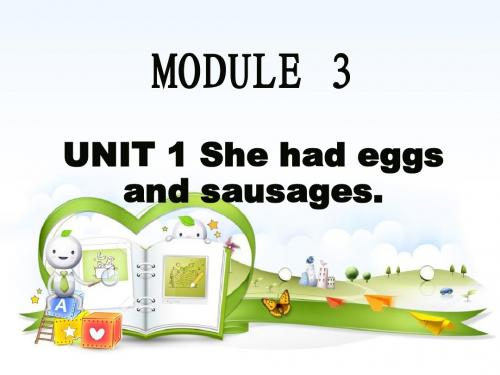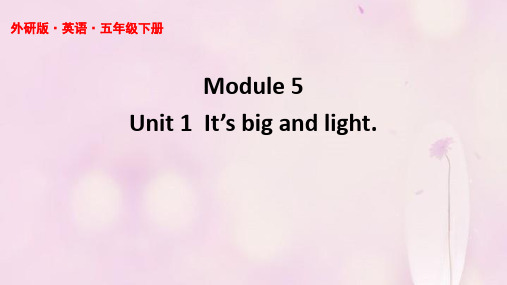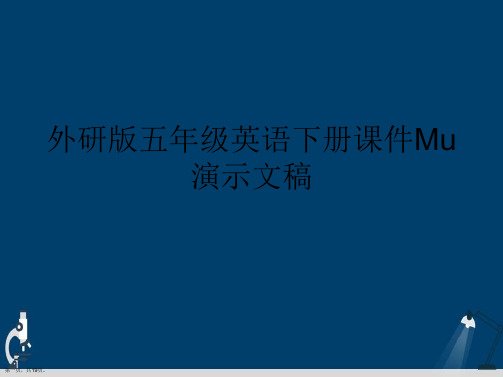外研版五年级英语下册全册【完整课件】
外研版一起英语五年级下册全册完整课件【下载】

Chant
?My father is a doctor. ?His name is Drew. ?He loves me very much. ?And I love him, too.
?My mother is a driver. ?Her name is Sue. ?She loves me very much. ?And I love her, too.
Can Lingling play the flute? No, she can't.
Practice
Lingling: My grandma … Sam: What ... Lingling: She ...
Lingling: My grandpa … Amy: What ... Lingling: He ...
What did she drive? She drove a bus.
What was Lingling's grandpa before? He was a flute player before.
What music did he play? He played Chinese music.
谢谢观看!
2.1
Module 2 Unit 1
What did she have for lunch?
Warm up
Free talk!
What's your favorite food?
Chant
? What did you have for dinner? ? Bread, meat and vegetables. ? What did you have for dinner? ? Fish, eggs and vegetables.
外研版小学五年级英语下册ppt课件

1
2
3
a
fish
4
5
6
7
8
Daming
Fangfang
She has g11
I’m going to visit my cousin in New York.His name is Simon. What present can I take?
I thinkhe’s got a toy panda. His mother and grandma arCeh_in_e_s_e_____.
13
Answer the questions:
No, he won't .
14
The second idea is ...
?
15
16
York?
What about a kite? Good idea! I’ll make a kite!
What about a toy panda?
I think he's
got a toy panda.His
mother and grandma
m
are Chinese.
12
What about _a_t_o_y_p_a_n_d_a_?
I’m going to __v_is_i_t my cousin in N__e_w_Y_o_r_k_. His name isSimon . What p_r_e_s_e_n_t _ can I take?
33
34
be a great present.
You can write
the Chinese word for
“dragon” on it.
外研版(一起)五年级英语下册全册课件

He’s got a train!
Ha ha…
office
fish
办公室
钓鱼
Ask and answer
How many people are there in the girl’s family?
There are five.
Where did her grandpa work? He worked in an office.
Where did her grandma work? She worked in a factory.
Where does her father work? He works in a hospital.
Where does her mother work? She works in a shop.
• What did you have for dinner?
• Fish, eggs and vegetables.
Presentation
I’ve got an email from lingling. Let’s read and talk about what she had.
Ask and answer
What is the email about? It’s about English food.
What did Lingling have for breakfast?
She had eggs and sausages.
What did Lingling have for dinner?
She had fish and chips.
点击标题自由选课
1.1
6.1
1.2
6.2
2.1
外研版(一起)五年级英语下册全册完整ppt课件

Practice
What did they do ten years ago?
He drove a taxi ten years ago. He was a taxi driver.
She helped children ten years ago. She was a doctor.
She taught in a school ten years ago. She was a teacher.
Where did her grandma work? She worked in a factory.
Where does her father work? He works in a hospital.
Where does her mother work? She works in a shop.
Presentahe UK with Amy and Sam. What was Lingling's grandparents? Do you want to know? Let's have a look.
Ask and answer
What was Lingling's grandma before? She was a driver before.
Homework
1. Read the dialogue freely, let's act it next class. 2. Write the new words five times.
谢谢观看!
1.2
Module 1 Unit 2
He worked in an office.
Warm up Matching game (Job and Place)
外研版英语五年级下册M3U1课件

Fanfan: ( What ) (did ) she (have) for( dinner )?
Daming:She( had )fish and (chips
和同学之间相互练习。
A: What did you have for breakfast ﹨ lunch ﹨ dinner?
B: I had……
短语
1.have got 拥有 2.have an English breakfast吃一顿英国早餐 3.have sandwiches 吃三明治 4.have … for dinner 晚餐吃 … 5.have fish and chips 吃炸鱼和炸土豆条 6.a traditional English dish 一顿传统的英国晚餐
traditional Chinese food
rice
noodles
moon cakes
dumplings
sweet dumplings
traditional English food
egg pudding
steak
cake
bread
hamburger
sandwich fish and chips
She had eggs and sausages.
4.What did Lingling have for lunch?
She had sandwiches.
5.What did Lingling have for dinner?
She had fish and chips.
Practise
Fanfan:What ( did )she have for( breakfast Daming:She ( had ) eggs and ( sausages). ). )?
外研版(一起)五年级英语下册全册课件

教学设计第1课【授课时间】1课时【教学目标】知识目标:1.Helping the students to master the phrases“get up”, “eat breakfast” and “go to school” and ask and answer about the time.2. Helping the students to be able to introduce the habit of rest and work of their own.能力目标:1. Helping the students to use the new words and sentences to express their likes and dislikes.2.Developing the Ss’ abilities of listening, speaking, reading and writing.情感态度价值观:Helping the Ss to foster a good habit of work and rest.【教学重点与难点】Key points: Using the sentences to intrduce the habit of rest and work.Difficult points: Understand and master the dialogue.【教学方式】1. Communicative , TPR and directly showing approach in Presentation2.Task-based learning Approach and Co-operative learning in groups in Consolidation【教学过程】Step 1 Warm-up1.Greetings: Hello, boys and girls! Nice to see you again.2.Doing some TPR actions.3.Having a free talk with the students.【设计思路】以上活动既可以营造英语学习的气氛,调动学生学习英语的积极性,拉近师生的距离,又为新课的学习设下了悬念,吸引了学生的兴趣。
外研版(三起)英语五年级下册Module5 Unit 1 It’s big and light课件

Read the text and imitate跟读
This black bag is_n_ic_e_. But it’s _h_e_a_v_y.
It’s _b_i_g_.
pockets
This green bag is __li_g_h_t. And it’s got two _p_o_c_k_e_t_s. But it’s _s_m_a_l_l .
外研版·英语·五年级下册
Module 5 Unit 1 It’s big and light.
Review.
red
green
blue
black
orange
Let’s say the opposite words.反义词
big大的— small小的
good好的— bad不好的
tall高的— short矮的 fat胖的— thin瘦的
A. department store B. station C. library
They are at the department store .
3.Which哪一个 bag has got pockets口袋?
Listen and choose.
3.Which哪一个 bag has got pockets口袋? A. the blue one B. the black one C. the green one
Homework
1.用It’s...和It‘s got...分别写一个句子。 2.观察你的书包、衣服、鞋子等身边物品并向你的 朋友和家人用英语描述一下它们。
Thank you
They saw three bags.
外研版五年级英语下册课件Mu演示文稿

Pairwork
A:What is he/she doing now?
B:He/She is...
A:What are you /they doing now? B:I am...
B:They are...
第十八页,共19页。
一般过去时
表示已经发生,已做 好的事。
标志:
last.../yesterday/...a go
须用动词过去式
(一般情况下动词直 接+ed)
现在进行时
表示正在做,正在发生的 事。
标志: now/look/listen/It's...( 时间)...
须用现在分词 (动词+ing形式)
第十九页,共19页。
第八页,共19页。
What did he do yesterday? He made a cake yesterday.
第九页,共19页。
What did he do yesterday?
He watched TV yesterday.
第十页,共19页。
Yesterday
He read a book. He had an ice-cream. They went to school. She did her homework. He made a cake. He watched TV.
make a cake
watch TV
read a book
had an ice-cream went to school
did my homework
made a cake
watched TV
第四页,共19页。
What did he do yesterday? He read a book yesterday.
- 1、下载文档前请自行甄别文档内容的完整性,平台不提供额外的编辑、内容补充、找答案等附加服务。
- 2、"仅部分预览"的文档,不可在线预览部分如存在完整性等问题,可反馈申请退款(可完整预览的文档不适用该条件!)。
- 3、如文档侵犯您的权益,请联系客服反馈,我们会尽快为您处理(人工客服工作时间:9:00-18:30)。
ago /ə ɡəʊ/ adv. 以前
讲解来自《点拨》
例句: I bought a book two days ago. 两天前我买了一本书。
短语: many years ago 许多年以前 five years ago 五年前
用法: “时间段 +ago”用于一般过去时态的句子中。
பைடு நூலகம்
讲解来自《点拨》
life /laɪf/ n. 生活
例句: We live a happy life. 我们过着幸福的生活。
复数: lives
联想记忆法: 以 f,fe结尾的名词,变为复数时,要变f,fe为ves! 如:wife→wives knife→knives leaf→leaves
魔法记忆: 妻子(wife)持刀(knife)去宰狼(wolf), 小偷(thief)吓得发了慌, 躺在架(shelf)后保己(self)命(life), 半(half)片树叶(leaf)遮目光。
television /'telɪvɪʒn/ n. 电视机
例句: We will buy a new television.
我们将要买一台新电视机。
缩写形式: TV 短语: a television set 一台电视机
on television 电视播放的
讲解来自《点拨》
there be 句型的一般过去时的否定句。 句型结构: There was / were + not + 主语 + 其他 .
用法: there be句型的一般过去时,表示过去(某地) 有某物。
句型结构: There was/were + 人 / 物 + 地点状语.
例句: There was a big tree here last year. 去年这儿有一棵大树。
Lingling is still in the UK with Sam and Amy. Amy:Look, Lingling! It’s a programme about China. Come and watch!
讲解来自《点拨》
知识点 4
It’s a programme about China. 它是一个有关中国的节目。
用法: 此句中about为介词,其后通常要跟名词、 代词或动名词。
例句: It’s a programme about dogs. 它是一个关于狗的节目。
知识点 5
讲解来自《点拨》
Life was very different in China many years ago. 在中国,许多年前的生活非常不同。
Lingling:I’m coming!
Old lady:Life was very different in China many years ago. Interviewer:How was it different? Oldlady:We lived in a small house. We didn’t have enough
句型结构: There is/are + 人 / 物 + 地点状语.
例句: There is a girl in the room. 房间里有个女孩。
讲解来自《点拨》
易错点 提示
如果there be后面有多个名词,be动词的单复数要由 离它最近的名词来决定。
讲解来自《点拨》
知识点 2
Well, there were two. 噢,(刚才)有两只。
food. There weren’t many buses. There weren’t any televisions.
Interviewer:How about now? Old lady:We live in a big house. We’ve got lots of food.
There are lots of buses and cars. I watch TV every day. Yesterday I watched TV with my grandchildren. Interviewer:Thank you for talking to us.
知识点 6
We lived in a small house. 我们住在一所小房子里。
用法: 本句用来表达“某人过去住在某地”。
句型结构: 主语 + lived in + 地点(+ 过去时间).
例句: She lived in Beijing in the past. 过去她住在北京。
讲解来自《点拨》
讲解来自《点拨》
different /dɪfrənt/ adj. 不同的 例句: Life was very different in Beijing many years ago.
在北京,许多年前的生活非常不同。 词形变化: difference n. 不同 对应词记忆法: same 相同的
短语:be different from... 与……不同
知识点 7
enough /ɪ'nʌf / adj. 充足的
短语: enough food 足够的食物
例句: They didn’t have enough food then. 那时他们没有足够的食物。
讲解来自《点拨》
知识点 8
There weren’t any televisions. 没有电视。
Amy:China is changing. Lingling:I miss China! I miss my grandma!
讲解来自《点拨》
知识点 3
still /stɪl / adv. 还,仍然
例句: Now I’m still in Beijing. 现在我仍然在北京。
用法: still是副词,在句中通常放在实义动词之前, 系动词之后。
外研版
五年级
(下册)
[精品]
Module 1
WY 五年级下册
讲解来自《点拨》
知识点 1
Look, there are two beautiful cats on the chair. 看,椅子上有两只漂亮的猫。
用法: there be 句型的一般现在时表示(现在)某地有某 人 / 物,be 动词的单复数由 be 动词后的主语决定。
